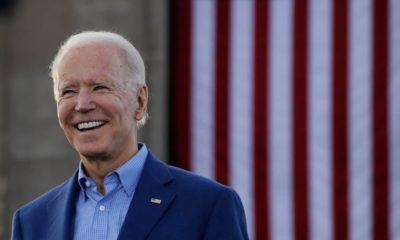Guest Writers
This Unsung Valley Hero Fought for the Dignity of America's Farmworkers
Published
5 years agoon
By
Opinion
Gilbert Padilla is one of the most unheralded and relatively unknown heroes who made major contributions to the national farmworker movement between 1962 and 1980.
A co-founder of the National Farm Workers Association with Cesar Chavez and Dolores Huerta, he never sought the national spotlight or gained public recognition during his approximately 20 years of selfless service to the union. He worked in relative obscurity, yet his footprints were on virtually every successful union organizing strategy and accomplishment.

Paul Garcia
Opinion
Personification of ‘Grapes of Wrath’ Hero
Padilla, who grew up in Los Banos, is the personification of Tom Joad, the fictionalized character in Grapes of Wrath. There are striking resemblances between Joad, the son of a tenant farmer, and Padilla, the farmworker organizer.
Upon his release from prison, Joad learns of his family’s dire circumstances: forced off their Oklahoma tenant farm, refugeed, and determined to seek work in California. During the family’s trek, Joad is castigated and called derogatory terms, like Okie and communist. After Padilla’s discharge from the U.S. Army, he faced indignant treatment as a farmworker. He and his brothers quit the fields after a supervisor’s admonishment for taking a cigarette break. These experiences form the genesis for both Joad and Padilla to fight for social justice.
On his journey home, Joad meets Jim Casey, a former preacher, who fosters a social consciousness in him. Casey is eventually killed defending strikers and Joad realizes the sacrifices required to serve others. Padilla also benefited from a preacher’s relationship.
Stopped Rent Increases on Substandard Farmworker Housing

(L to R) Dolores Huerta, Cesar Chavez, Gilbert Padilla, and Ted Kennedy. (UC San Diego Library)
When the Tulare County Housing Authority took ownership and proposed a rent increase, Padilla, Drake, and others organized a rent strike. The strikers succeeded in getting the rent increase rescinded through court action.
In August 1965, Padilla and Drake learned that female farmworkers at J. D. Martin Farms were forced to find restroom privacy in the fields, away from male workers. The foreman habitually peeked at the women. When Padilla learned of the foreman’s repugnant behavior, he chastised the male farmworkers for allowing this defilement of their wives and pulled the workers out. The strike resulted in the availability of toilets and improved wages.
Chavez Sent Padilla to Organize in Texas
With such successes, Chavez dispatched Padilla to lead a fledgling melon strike in Starr County, Texas, in 1967. Upon arriving, Padilla realized the strike meant more than efforts to gain better wages and working conditions. Significantly, the striking Mexican-descent agricultural workers demanded an end to the collusion between state and local law enforcement authorities, the judicial system, and melon growers. The first day Padilla reached the melon strike, he and Drake were arrested on the steps of a Texas courthouse for reciting the Lord’s Prayer.
To Padilla, the farmworker movement meant more than increased wages and improved working conditions. It aimed to advance civil liberties through an activist platform that taught farmworkers forms of empowerment.
It remains unknown what became of Tom Joad. He was last seen hiding in bushes as an outlaw for killing a man. It’s conceivable that Joad might have lived out the chronological experiences similar to Padilla. Tom’s promise to his mother is instructive:
“Wherever they’s a fight so hungry people can eat, I’ll be there. Wherever they’s a cop beatin’ up a guy, I’ll be there. …”
Padilla’s mother supported his altruistic struggle for social justice. He painfully recalls how she was sprayed with DDT pesticide when entering the United States from Mexico. Padilla redesigned the calculus on organizing farmworkers and changed the narrative to redress inequities on a wider scope. His social construct defined farmworkers as more than an occupational status, but as a disenfranchised population.
Movement About More than Wages and Work Conditions
To Padilla, the farmworker movement meant more than increased wages and improved working conditions. It aimed to advance civil liberties through an activist platform that taught farmworkers forms of empowerment. Like Padilla, Joad would certainly have advanced social justice beyond the scope of dispossessed migrant farmworkers.

UFW leaders (left to right) Marc Grossman, Gilbert Padilla, Cesar Chavez and Richard Ybarra in Washington, D.C. in 1979. (AP via Wayne State University Library)
Last Dec. 21, Padilla turned 92. Meanwhile, it has been 80 years since the book publication that introduced Tom Joad and shocked the American public about the deplorable treatment of migrant farmworkers. Since then, John Steinbeck’s prophetic character has captured the prospect of social activism.
In that sense, Tom Joad never died. And Gilbert Padilla is the embodiment of Joad’s legacy today.
About the Author
Paul A. Garcia is a retired educator. He has written commentary pieces on education and issues that affect the Latino community. He has a doctorate degree in Educational Leadership from Fresno State/UC Davis.
You may like
-


California Moves To Consider Reparations for Slavery
-


Thousands Gather at March on Washington Commemorations
-


Costa Remembers John Lewis: He Tried to Heal ‘Racial Divide’
-


Today’s Protests Against Racism Carry Echoes of Farmworker Equity Struggle
-


Biden Hires Chávez Granddaughter to Help on Latino Outreach
-


Latest State ‘Green’ Edict Discriminates Against Minorities: Lawsuit














Tom Esqueda
February 17, 2020 at 8:37 pm
I enjoyed reading this article. I worked years ago with Gilbert at a local life insurance agency. He took me aside and kindly offered me candid advice regarding this new adventure in my life which I very mucah appreciated. And just a few days ago I saw him for the first time in decades enjoying breakfast at Julia’s Restaurant in Fresno. I reintriduced myself to him and once again thanked him for his candor so many years ago. He exemplifies God’s love. May Gilbert’s light shine brightly for many more years.
Lori de Leon
February 18, 2020 at 11:05 pm
Cesar Chavez often referred to Gilbert Padilla as a great resourceful organizer.
On another note, the author of this article misspells Dolores Huerta’s name. SMH!
Bill McEwen
February 19, 2020 at 8:29 am
Thanks, Lori. We should have caught that in editing. The error has been corrected.
Marc Grossman
February 19, 2020 at 2:40 pm
I had the privilege of knowing and working with Gilbert in the 1970s. The UFW and farm worker movement have always respected and acknowledged Gilbert as a co-founder of the UFW. He was one of the few early organizers who worked together with Cesar starting in the Community Service Organization civil rights group during the ‘50s and early ‘60s. Thanks also for including the photo taken in 1979 of (from left) me, Gilbert, Cesar and Richard Ybarra with the Capitol dome behind us. That was during Cesar’s national boycott tour that year, which I advanced. Gilbert was heading up the boycott in Washington, D.C.
Pancho Rodríguez
February 19, 2020 at 6:06 pm
My whole family worked with the union amduring the grape strike
Frank Rodríguez- father
Elizabeth Rodríguez -mother Phillip, Deborah and Elizabeth Rodríguez – sisters and Brother Felipe Rodríguez.
Wonderful and Tough times
Gilberto Padilla with his gentle firm persistence wasn’t Fathers Hero
PANCHO Rodríguez
Juan D. Martinez
February 19, 2020 at 10:39 pm
In the 60’s -70’s Gilbert came to Salinas to help organize Farmworkers and local youth in support of the NFWOC/UFW. Gilbert later joined C.R.L.A. were we both worked along with Gilbert Florez on major farmworker issues including pesticide cases and legislative action. ViVa brother Gibert Padilla our example of a Hero.
Jeanne McNassar
February 21, 2020 at 10:19 am
The Silver Fox is what we called him. I had the great honor to work with this savvy gentleman. I tell my children about how he had my back when I most needed it. How he showed me respect and support as a very young female organizer. If you read this Gilbert, thank you.❤